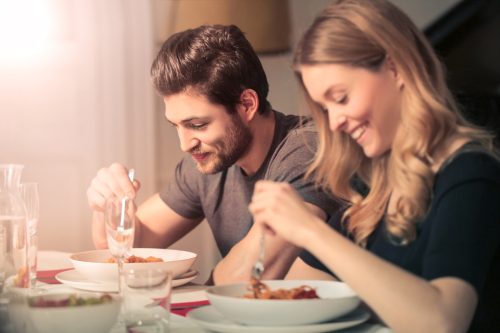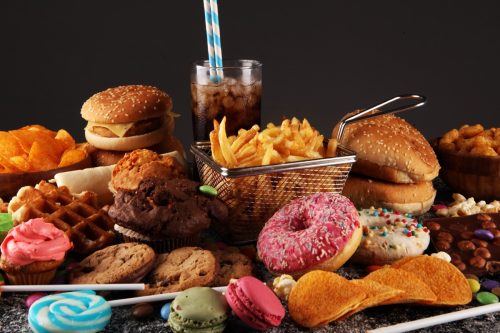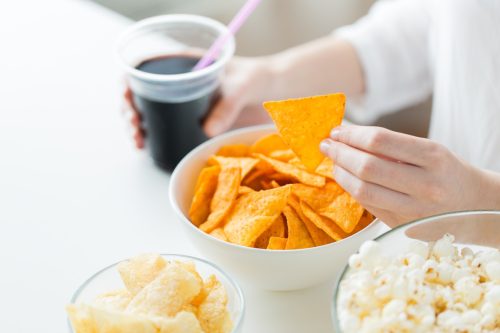1 in 3 People Say Eating This Is a Relationship Dealbreaker, New Data Shows
You may want to order something else the next time you're on a date.

Being in a relationship can be a wonderful feeling, and knowing that you've found "your person" is a special kind of thrill. But it's no secret that relationships are hard work, and while it's nice to have someone to spend quality time with, you're bound to find out more about the other person's habits and quirks, for better or worse. A new survey found that one difference in the dining room could actually be detrimental to your relationship as a whole. Read on to find out which eating habit 1 in 3 people say is a dealbreaker, and why experts think you should address it head on.
READ THIS NEXT: 5 Relationship Red Flags Everyone Misses, Experts Warn.
Food is an integral part of any relationship.

Odds are that you and your partner will spend a lot of time sharing meals, whether you prefer to eat out or stay home and cook.
"You are greatly affected by the eating habits of your partner, especially if you are already living together," Craig Miller, psychologist and cofounder of Academia Labs, says. "For many couples, eating together is a form of love language, an activity that can be considered part of quality time."
In addition, food is simply enjoyable. We may eat primarily out of necessity, but there are additional benefits and components to eating that we don't even realize.
"Food holds more meaning to people than just nutrition," Michelle Johnson Jerome, master health coach at Balanced Healthstyles, explains. "There are social, physical, emotional, existential, mental, and environmental aspects at play each time a person chooses their food."
With that in mind, it may not be surprising that certain food choices can cause problems in relationships.
A survey found one food group is troublesome for relationships.

If you find that you're often reaching for potato chips or always ordering something fried for dinner, you might want to rethink that choice. According to recent findings from a survey of 2,000 Americans, 1 in 3 respondents said that if their partner ate too much junk food, it would be a dealbreaker. The survey was conducted by OnePoll on behalf of GoodCook, the New York Post reported.
Interestingly, while participants are judgmental about their partners, nearly half of respondents said that eating junk food is one of their own worst habits. When it comes to fast food, 49 percent of respondents said they eat it occasionally, but 38 percent wouldn't want their partners to do the same.
For more relationship advice delivered straight to your inbox, sign up for our daily newsletter.
Conflict arises because partners have different perspectives.

Experts say there are a few main reasons why eating habits—specifically junk food—can cause a romantic rift. These foods are often criticized for a lack of nutritional value, including a high calorie count, and poor ingredients that can eventually lead to weight gain, Greg Flemming, founder and author at Mint Date, explains.
"One partner may feel self-conscious about their weight gain and become less confident, which can lead to arguments or tension," Flemming says. "Alternatively, the partner who is not gaining weight may feel resentment towards the partner who is, especially if they are trying to eat healthily themselves."
And beyond this difference in food perspectives and how it affects the number on the scale, too much of this junk food can have negative effects on your health.
"In addition to causing arguments, junk food can also impact a relationship in more physical ways," Flemming notes. "For example, eating lots of junk food can lead to poorer cardiovascular health, which can put a strain on intimacy. It can also lead to conditions like erectile dysfunction, which can further affect a couple's sex life."
When in doubt, talk it out.

Thankfully, experts do offer some advice on how to tackle these issues if they do arise in your relationship. Jerome makes a point to emphasize that labeling certain foods as "junk" is more harmful than helpful, even though some foods might have limited nutritional value. As with most things, she suggests that communication is key if you're frustrated with your partner's food choices.
"The best thing to do is talk about your expectations and why they are important to you," she says. "Enter the conversation not to prove that your way is correct but to express your feelings and why you value a certain way of eating."
It's not realistic to "eat perfectly" all of the time, Jerome adds, noting that you can't turn around and expect your partner to eat perfectly either.
Justine Chan, registered dietitian and founder of Your Diabetes Dietitian, recommends that partners make a weekly grocery list together, "planning out date nights for the occasional indulgence." If there are specific triggers for buying and eating less nutritional foods, you can also take those into consideration, she adds.





















